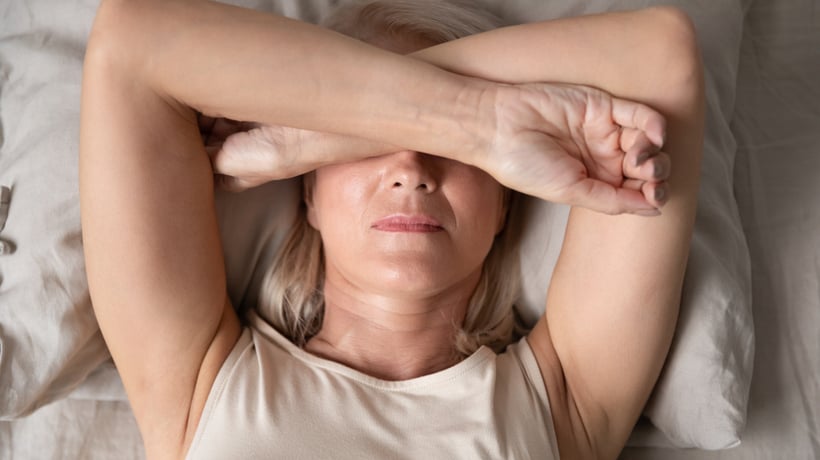Menopause can cause a lot of discomfort and inconvenience, such as disrupted sleep. Up to half of all menopausal women will experience sleep complications compared with 15 percent of the general population. But while there is no cure for Menopause, there are steps you can take to get back your sleep:
Decrease hot flashes
Wearing loose, moisture-wicking clothing, using a bedside fan, and keeping a glass of cool water on your nightstand can all help with night sweats. You should try to avoid hot flash triggers such as spicy food, caffeine, and alcohol. You can also talk with your doctor about whether hormone replacement therapy (HRT) may be right for you. The treatment has been found to help women fall—and stay—asleep. “Recent studies have also shown efficacy for yoga and acupuncture,” says Laurie Jeffers, a nurse practitioner. Dr. Sherry Ross, OB/GYN agrees and adds that if the hot flashes are mild, trying black cohosh or passionflower extract supplements could help, but you should tell consult your doctor on what to take.
Treat sleep apnea
Sleep apnea is characterized by loud snoring and frequent gasp-like interruptions in breathing throughout the night that can disrupt your shut-eye and cause daytime fatigue. “Postmenopausal women are two to three times more likely to have sleep apnea compared with premenopausal women,” Grace Weiwei Pien, M.D., M.S.C.E. says, “Women often have more subtle symptoms of sleep apnea than men. Thus, they may be less likely to seek evaluation for sleep apnea.” Untreated, the disorder can increase the risk of heart trouble, diabetes, and more. If you have symptoms, talk with your doctor.
Adopt good sleep habits
“Establishing good sleep hygiene is first-line treatment for any sleep disturbance,” says Jeffers. She advises against using sleeping pills or benzodiazepines (such as Valium and Xanax) as long-term solutions, due to adverse side effects like dependence and withdrawal. Ross suggests “exercising regularly, eating a diet focused on fresh fruits, vegetables, whole grains and fish [and] limiting alcohol intake and red meat, similar to the Mediterranean diet.” Dr. JoAnn E. Manson recommends limiting screen time at least an hour before bed, and sleeping in cool, dark, and quiet rooms. Pien says women should aim for between seven and eight hours of quality, uninterrupted sleep per night.
Talk with your doctor
Ross and Jeffers suggest seeing your primary care physician to discuss any symptoms bothering you. “In general, if you’re waking up regularly during the night and feel that your sleep isn’t restful, those are signs that maybe you’re not getting good sleep,” says Pein. Heide Moeling, M.D., an obstetrician and gynecologist, says, “From a ‘natural’ standpoint, melatonin has been shown to help reduce minor sleep difficulties.” But you should get your doctor’s okay before taking any new supplements. Ross adds that anxiety, depression, and other mood disorders that can accompany menopause may also be responsible for some women’s sleep problems. If your doctor prescribes them, antidepressants and other mood-stabilizing medications may effectively treat symptoms like depression and anxiety — and help restore sleep.
Sources:
How to Sleep Better During Menopause
How Does Menopause Affect My Sleep?
Get a better night’s sleep during menopause
5 Ways to Get Better Sleep During Menopause
Sleep Problems and Menopause: What Can I Do?



